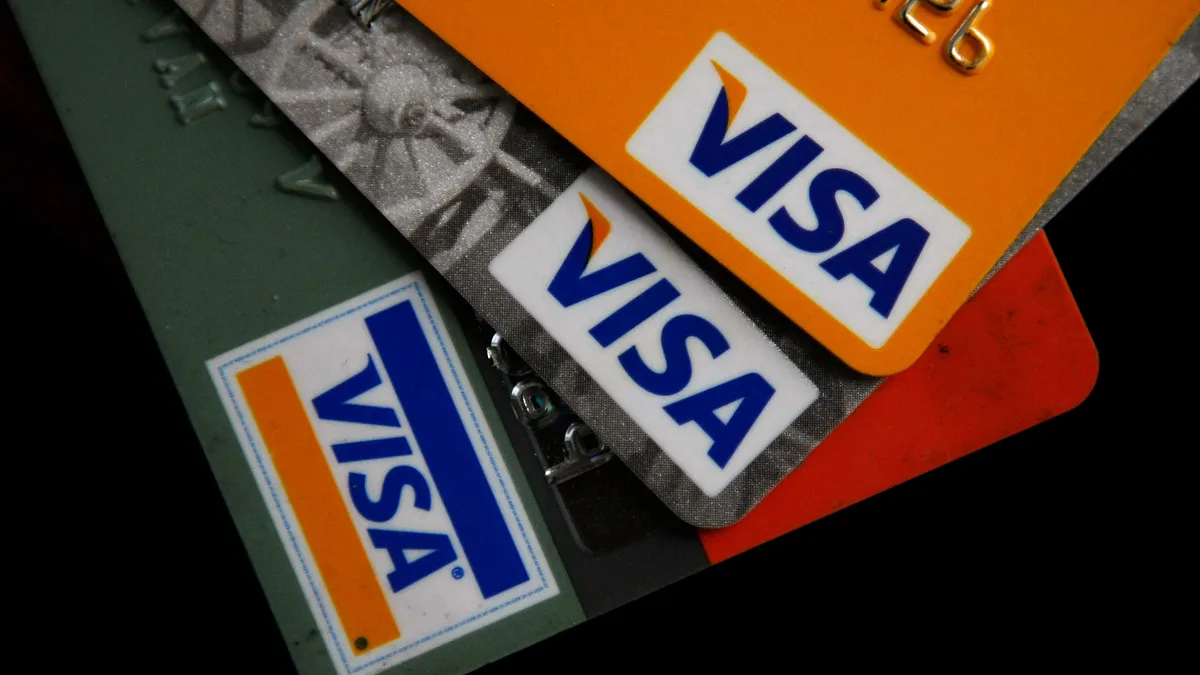Merchants entrenched in litigation against Visa for years may still be owed as much as $4 billion as part of expected settlements, the card network company recently told analysts.
In a call to discuss a share exchange offer Visa recently floated with its stockholders, CEO Ryan McInerney told analysts the card giant values the unresolved claims at between $1.4 billion and $4.0 billion, according to a transcript of the Sept. 13 call. That estimated range for settling outstanding claims is based on settlements already reached, he told the analysts.
Despite that billion-dollar outstanding amount, the company contended it has largely resolved the claims brought in class actions by millions of merchants over more than a decade. The merchants alleged they were overcharged for credit and debit card transactions when consumers swiped their cards to pay for goods and services.
“Since the IPO, we have made significant progress in the U.S.-covered litigation with one matter remaining,” McInerney told analysts, according to the call transcript. “And for that one matter, we have settled claims representing approximately 90% of the payments volume and interchange at issue.”
San Francisco-based Visa offered that assessment last month as part of a pending offer to exchange some of its outstanding shares, and thereby revamp restrictions tied to some shares that have responsibilities for coverage of litigation expenses. The company disclosed the exchange offer in a regulatory filing last month.
However, Visa noted in an accompanying Sept. 13 presentation to investors, that its “remaining damages exposure,” based on outstanding claims by merchants, is between $25 billion and $35 billion through last year. That doesn’t take into account legal challenges Visa may face or any potential trebling of damages, the presentation said.
Visa is seeking an exchange offer that would allow the holders of its class B shares, which are mainly financial institutions, to benefit from less stringent transfer restrictions. The company also has class A and class C shares.
“Merchants have been paid $6.4 billion for the 90% of volume settled,” according to a note that analysts at the financial firm Robert W. Baird sent to their investment clients. An escrow account set up by Visa to cover the litigation has a balance currently of $1.6 billion, with class B shareholders on the hook to cover any value over that amount, the Sept. 13 Baird note said.
The litigation has persisted with some plaintiffs despite millions of retailers reaching a $5.6 billion settlement with the card network giant last year.
That settlement was affirmed by an appellate court this year, and it was the biggest case that Visa had faced, in terms of the monetary implications, said Lloyd Constantine, one of the lawyers representing merchants with outstanding claims.
Nonetheless, still outstanding are claims against Visa brought by some major U.S. merchants, including the coffee chain Starbucks, Constantine noted. While his firm has represented Starbucks and convenience store chain 7-Eleven in the litigation, the law firm Vorys, Sater, Seymour and Pease has represented other plaintiffs suing Visa, including consumer goods retailer Home Depot, he said. Claims brought by 7-Eleven and Home Depot against Visa have been settled, though other claims are outstanding, Constantine said this week in an interview. A spokesperson for Vorys declined to comment on the litigation.
The litigation has entangled Visa’s chief rival Mastercard for years as well.
Constantine, whose New York firm Constantine Cannon has represented some of the biggest merchants in the Visa litigation, isn’t convinced that the company has resolved such a high percentage of the fees at issue. Last month, he estimated the company had settled about half the claims. He declined to provide an update Monday.
Visa didn’t immediately respond to a request for any additional comment on the outstanding litigation.
Correction: This article has been updated to reflect that 7-Eleven and Home Depot have settled their claims with Visa, though some of their co-plaintiffs have not. It has also been updated to clarify that the $1.4 billion to $4 billion range is Visa’s estimate of the value of expected future settlements, not merchants’ outstanding claims.











